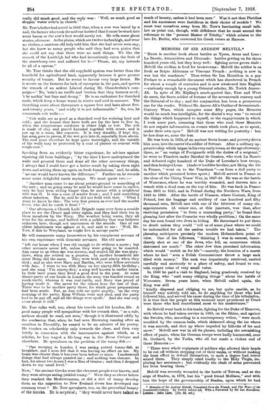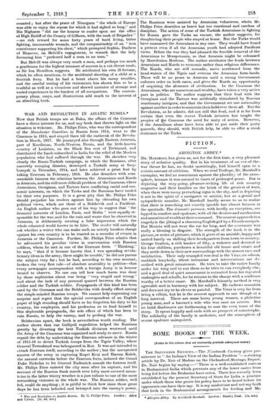MEMOIRS OF SIR ANDREW MELVILL.*
" HERE is another book about battles at Ypres, Arras and Lens : La Bassee, Armentieres and Dixmude : battles getting on for three hundred years old, but they keep well : fighting never grows stale : Melvill the civilian is food for bookworms : Melvill the soldier is as fresh as Scipio Africanus or Viscount French : nothing is new in war but the machines." Thus writes Sir Ian Hamilton in a gay Preface to a remarkable document which has slumbered in French for about a couple of centuries and is now awakened into English —curiously enough by a young Oriental scholar, Mr. Trick Ameer- Ali. In spite of Mr. Kipling's much-quoted line, East and West do meet, the Scots soldier of fortune of the seventeenth century and the Oriental of to-day ; and the conjunction has been a prosperous one for the reader. Without Mr. Arneer-Ali's Outline of Seventeenth- Century Wars, which occupies some fifty pages, the Memoirs would be much less intelligible, for the diarist's way was " to record the things which happened to myself, or the engagements in which I took some part, assuming that those who read these Memoirs do not require information on events which took place, so to speak, under their own eyes." Melvill was not writing for posterity : but he has done so, none the less.
He was born is 1624, of an ancient Scots house, and poverty drove him soon into the career of wieldier of fortune. After a military ap- prenticeship which began in his very early teens, at the age of twenty- three, as " an ensign of Footguards with the duties of a sergeant," he went to Flanders under Marshal de Gassion, who took La Bass& and defeated eight hundred of the Duke of Lorraine's best troops, and then besieged Lens. (Andrew's soldier brother, not liking the life in France, " went on to the Venetians "—as from a dull party to another which promised better sport.) Melvill served in France at the close of the Thirty Years' War, in 1647-48. He was at the battle of Worcester, where he was terribly wounded, and thrown into a trench with a dead man on the top of him. He was back in France from 1651 to 1665, and in Poland during the Northern Wars, from 1655 to 1660. After the battle of Warsaw, where Casimir, King of Poland, lost the baggage and artillery of one hundred and fifty thousand men, Melvill met with one of the bitterest of many dis- appointments. (A minor one, at this juncture, was that, after receiving permission " to form a marauding party," he found that gleaning loot after the Cossacks was wholly profitless.) On the same day his men found two Jews in hiding. He threatened to put them to death unless they could " tell us of some place where we could be indemnified for all the useless trouble we had taken." The phrasing anticipates precisely the modern Hohenzollern point of view. One of his followers, " thinking I was in earnest, imme- diately shot at one of the Jews, who fell, an occurrence which distressed me much." The other Jew then promised information which would " enrich us for life "—namely, the location of a marsh where he had " seen a Polish Commissioner throw a large sack filled with money." The sack was impatiently retrieved, carried carefully and anxiously to a place of safety, and found to con- tain copper coins of very small value.
In 1660 he paid a visit to England, being graciourey received by the King, who " said many obliging things " about the battle of Worcester. Seven years later, when Melvill called again, the King was still " kindly disposed and obliging to me, but mete unable, as he himself very naively told me, to do anything for those who bad followed him, and served his cause during the time of his tribulation. It is true that the people at this moment most prominent at Court were those who had contributed most to his misfortunes."
So Melvill went back to his trade, fighting for the Duke of Hanover, with whom he had taken service in 1665, on the Rhine, and against the Swedes, who, according to a contemporary writer, " were much troubled by the cannon-balls, which skimmed along the ice where it was smooth, and shot up where impeded by hillocks of ice and snow." Melvin saw war in all its phases, including the astonishing effect of panic, when his German troops were badly hammered, near St. Gothard, by the Turks, who all but made a violent end of these Memoirs :—
" There were whole regiments of soldiers w/eo allowed their heads to be cut off without stepping out of their ranks, or without making the least effort to defend themselves, to arch a degree had terror seized them. They simply cried loudly to the Rely Virgin, im- ploring her assistance ; but evidently the clash of -arms prevented her from hearing them."
Melvill was severely wounded in the battle of Troves, and at the siege of Staten, in 1476, lost his " good friend Mollison," and with him the hope of the governorship of Staden, upon which he had
• Memoirs of Sir Andrew Metall, Translated from the Frmsok and The Wars of tie Seventeenth Century. By Torlek Ameer-Aii. With a Foreword by Sir Ian Hamilton. Withal . John Laue, [105. 4d, net.j
counted ; but after the peace of Nimeguen " the whole of Europe was able to enjoy the repose for which it had sighed so long," and His Highness " did me the honour to confer upon me the office of High Bailiff of the County of Gifhorn, with the rank of Brigadier " —no rich reward for some forty years of hard living, bitter fighting, innumerable wounds, and the companionship of an " iron contrivance supporting his chest," which prompted Sophia, Duchess of Hanover, on Melvill's engagement, to remark that the lady favouring him " preferred half a man to no man."
But Melvin was always very much a man, and perhaps too much a gentleman for the highest measure of success in a cut-throat trade, as Sir Ian Hamilton suggests. He attributed his own ill-fortune, which he often mentions, to the accidental shooting of a child at a Scottish ferry. But he had a heart above his many troubles, and the careful testing of his statements has shown him to be a truthful as well as a vivacious and shrewd narrator of strange and varied experiences in the hardest of all occupations. The contem- porary plans, maps, and illustrations add much to the interest of an absorbing book.



























 Previous page
Previous page